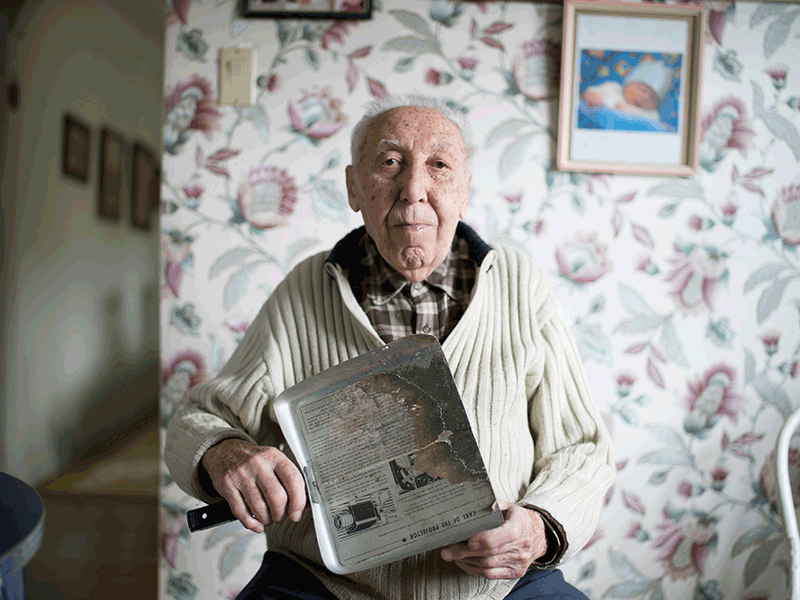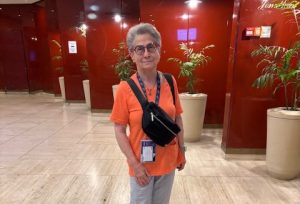“Everything I needed that I didn’t have, I made,” says Lejb Pilanski about practical objects such as lamps, a dustpan and a boot-remover he created in his tidy basement workshop using parts from what many would consider junk.
Pilanski, a 97-year-old former tailor and a Holocaust survivor, has never considered himself an artist. But about 10 years ago, Pilanski’s grandson, filmmaker Sean Wainsteim, began to see the beauty in one of his grandfather’s assemblages, a dustpan he made using the inside of a 16mm film projector’s case and a handle from a discarded pot.
Last January, after Pilanski’s wife of 70 years, Ester, died, Wainsteim decided to mount a mixed-media exhibit featuring photographs of his grandfather’s creations as well as some objects, his grandfather’s personal documents, textiles and audiovisual material. The show, ZEIT GEZUNT // KEEP WELL, opens at Toronto’s Red Head Gallery on Aug. 2.
‘Lejb took whatever scraps the world left him and envisioned new ways to transform them into something functional’
The personal documents in the exhibit, among them a displaced person identification card, chronicle Pilanski’s journey from postwar eastern Europe to Canada. The photographs Wainsteim took of Pilanski’s repurposed objects include pithy comments from the creator about the pieces, such as: “Anything I made, no one is going to copy me.”
 In one of the photographs, Pilanski wears headphones he constructed using an elastic band from an old pair of pants. “There’s only a headphone on one side. I’m not sure why. Probably so he could still hear out of the other side,” Wainsteim said.
In one of the photographs, Pilanski wears headphones he constructed using an elastic band from an old pair of pants. “There’s only a headphone on one side. I’m not sure why. Probably so he could still hear out of the other side,” Wainsteim said.
Among the textiles featured in the show is a bib Pilanski sewed for his late wife, with her name embroidered on it. Sewing and stitching are at the core of what he does.
His grandfather’s life was steeped in loss and hardship and he trained himself to be adaptable, Wainsteim said. “Lejb took whatever scraps the world left him and envisioned new ways to transform them into something functional.”
Born in Grodno, Poland (now Belarus), Pilanski was forced to join the Russian army during the Second World War. While he was fighting the Nazis, his entire family was murdered. Expelled from Russia after the war, Pilanski took a westbound train, where he met Ester and her brother. They were smuggled into France – the couple’s daughter, Ginette, was born in Paris – and they came to Canada in 1950 as displaced person refugees, settling in downtown Toronto.
Pilanski worked for decades as a tailor in a sweatshop doing piecework. The last 10 years of his working life he spent as a tailor at Simpson-Sears. In the bungalow he bought in North York in the early 1960s, he built a workshop and a sewing room in the basement, where he keeps several vintage sewing machines he’s repaired and the bobbin threader he invented. He used to make clothing for his own customers in his spare time.
Organizing the exhibit was a good excuse to spend time with his grandfather after Ester died, Wainsteim said. “It’s not always easy to talk, so to have a project to do together has been really great.”

He said his grandfather has always viewed his creations as strictly utilitarian, but through the process of putting the show together he’s starting to see his work outside of that perspective.
Wainsteim said growing up watching his grandfather making his “unique and wonderful” creations has influenced his views on conservation and how he approaches his own work as a filmmaker. “As I get older, I realize how much it has affected me, both in conservation of things and collecting ideas or objects and putting them together,” he said. “I think a lot of what I do as a filmmaker is putting together pieces of things. Definitely, a part of who he is, is in the work I do.”
ZEIT GEZUNT // KEEP WELL opens at the Red Head Gallery, 401 Richmond St. West, Toronto, on August 2 with a reception from 5 to 8 p.m. and runs until August 5. For more information, visit www.redheadgallery.org.







